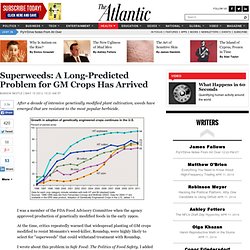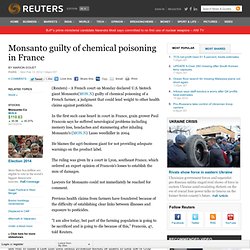

Health - Marion Nestle - Superweeds: A Long-Predicted Problem for GM Crops Has Arrived. After a decade of intensive genetically modified plant cultivation, weeds have emerged that are resistant to the most popular herbicide.

I was a member of the FDA Food Advisory Committee when the agency approved production of genetically modified foods in the early 1990s. At the time, critics repeatedly warned that widespread planting of GM crops modified to resist Monsanto's weed-killer, Roundup, were highly likely to select for "superweeds" that could withstand treatment with Roundup. I wrote about this problem in Safe Food: The Politics of Food Safety. I added this update to the 2010 edition: Late in 2004, weeds resistant to Monsanto's herbicide Roundup began appearing in GM plantings in Georgia and soon spread to other Southern states. Today, the idea that planting of GM crops is "widespread" is an understatement. So, according to Reuters, is Roundup resistance.
Weed resistance has spread to more than 12 million U.S. acres and primarily afflicts key agricultural areas in the U.S. Canada endorsing Monsanto 'suicide seeds' Feature story - February 9, 2005 A document leaked to the ETC group reveals that Canada is going to the UN to promote "terminator" technology: genetically engineered (GE) seeds designed to grow crops which can't reproduce.

These "suicide seeds," designed solely to protect the patents and profits of multinational corporations, are currently forbidden from being planted outside the lab. The secret instructions to Canada's delegation: block concensus on any other option than testing these seeds in the wild. Terminator seeds don't produce replantable offspring. "Canada is about to launch a devastating kick in the stomach to the world's most vulnerable farmers - the 1.4 billion people who depend on farm saved seed," said ETC Group Executive Director Pat Mooney speaking from Ottawa. Public outrage greeted "suicide seeds" when they were introduced in 1988. We contacted Mr Stefan Yarrow, Director of the plant Biosafety office of the Canadian Food Inspection Agency. GMO Plants establish in the wild. Monsanto guilty of chemical poisoning in France. By Marion Douet PARIS Mon Feb 13, 2012 7:44pm IST PARIS (Reuters) - A French court on Monday declared U.S. biotech giant Monsanto(MON.N) guilty of chemical poisoning of a French farmer, a judgment that could lend weight to other health claims against pesticides.

In the first such case heard in court in France, grain grower Paul Francois says he suffered neurological problems including memory loss, headaches and stammering after inhaling Monsanto's (MON.N) Lasso weedkiller in 2004. He blames the agri-business giant for not providing adequate warnings on the product label. The ruling was given by a court in Lyon, southeast France, which ordered an expert opinion of Francois's losses to establish the sum of damages. Lawyers for Monsanto could not immediately be reached for comment. Previous health claims from farmers have foundered because of the difficulty of establishing clear links between illnesses and exposure to pesticides. Whole Foods Market Caves to Monsanto. Monsanto's 5 Most Dubious Contributions To Planet Earth. By Oliver Lee takepart.com Oh, Monsanto, you sly dog.

You keep trying to make us believe you are “committed to sustainable agriculture” with your canny advertisements on American Public Media, even as you force-feed farmers your lab-grown Frankenseeds that expire every year (which are, let’s be honest, opposite of sustainable). But we shouldn’t be surprised by the mixed message, should we? After all, you’ve been doing this for decades. On that note, let’s take a quick look at some of the biotech giant’s most dubious contributions to society over their past century in business. 1. Monsanto burst onto the scene in 1901 with the artificial sweetener saccharin, which it sold to Coca-Cola and canned food companies as a sugar replacement.But as early as 1907, the health effects of the sweetener were being questioned by Food and Drug Administration (FDA) scientists. “Everyone who ate that sweet [canned] corn was deceived,” said Harvey Wiley, the first commissioner of the FDA.